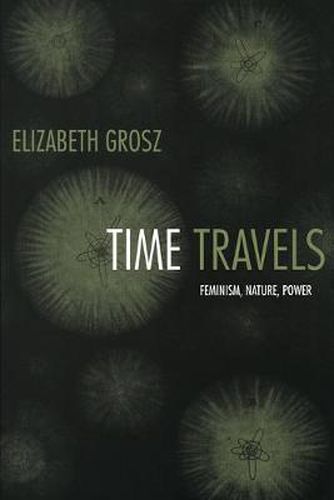Readings Newsletter
Become a Readings Member to make your shopping experience even easier.
Sign in or sign up for free!
You’re not far away from qualifying for FREE standard shipping within Australia
You’ve qualified for FREE standard shipping within Australia
The cart is loading…






While concepts of time underlie many of the central projects of feminist theory, law and justice, and the natural sciences as well as ideas about political struggle, temporality is rarely their direct object of analysis. In her essays brought together in this volume, Elizabeth Grosz moves questions about time and duration to the fore in order to explore how rethinking temporality might transform and revitalize key scholarly and political projects. Dealing with time in relation to topics ranging from female sexuality to conceptions of power to understandings of cultural studies, these essays reveal Grosz’s advocacy of a politics of invention, a politics that cannot be mapped out in advance–one that is more invested in processes than in results. Grosz’s reflections on how rethinking time might generate new understandings of nature, culture, subjectivity, and politics are wide-ranging. She moves from a compelling argument that Charles Darwin’s notion of biological and cultural evolution can potentially benefit feminist, queer, and antiracist agendas to an exploration of modern jurisprudence’s reliance on the sense that the future is always beyond reach. She examines Henri Bergson’s philosophy of duration in light of the writings of Gilles Deleuze, Maurice Merleau-Ponty, and William James, and she discusses issues of sexual difference, identity, pleasure, and desire in relation to the thought of Friedrich Nietzsche, Michel Foucault, Deleuze, and Luce Irigaray. Together, these essays demonstrate the broad scope and applicability of Grosz’s thinking about time as an under-theorized but uniquely productive force.
$9.00 standard shipping within Australia
FREE standard shipping within Australia for orders over $100.00
Express & International shipping calculated at checkout
While concepts of time underlie many of the central projects of feminist theory, law and justice, and the natural sciences as well as ideas about political struggle, temporality is rarely their direct object of analysis. In her essays brought together in this volume, Elizabeth Grosz moves questions about time and duration to the fore in order to explore how rethinking temporality might transform and revitalize key scholarly and political projects. Dealing with time in relation to topics ranging from female sexuality to conceptions of power to understandings of cultural studies, these essays reveal Grosz’s advocacy of a politics of invention, a politics that cannot be mapped out in advance–one that is more invested in processes than in results. Grosz’s reflections on how rethinking time might generate new understandings of nature, culture, subjectivity, and politics are wide-ranging. She moves from a compelling argument that Charles Darwin’s notion of biological and cultural evolution can potentially benefit feminist, queer, and antiracist agendas to an exploration of modern jurisprudence’s reliance on the sense that the future is always beyond reach. She examines Henri Bergson’s philosophy of duration in light of the writings of Gilles Deleuze, Maurice Merleau-Ponty, and William James, and she discusses issues of sexual difference, identity, pleasure, and desire in relation to the thought of Friedrich Nietzsche, Michel Foucault, Deleuze, and Luce Irigaray. Together, these essays demonstrate the broad scope and applicability of Grosz’s thinking about time as an under-theorized but uniquely productive force.